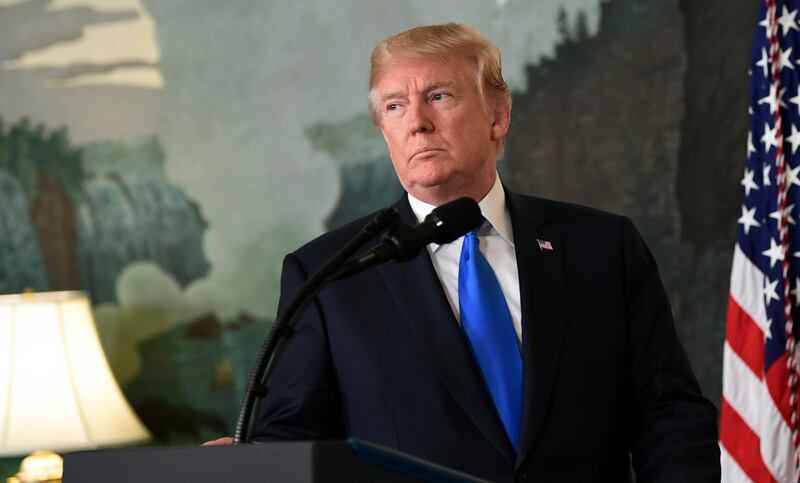Arab countries welcomed US president Donald Trump’s speech to confront the “fanatical regime” of Iran, during which he threw a landmark international nuclear agreement into doubt.
Meanwhile, leaders in western countries said they were “concerned by the possible implications” of Mr Trump’s decision not to recertify Iran’s compliance with the Joint Comprehensive Plan of Action to Congress.
The UAE’s minister of state for foreign affairs said that Iran is a “major source” of instability in the Middle East.
“The premise that the JCPoA would moderate Iran’s policy has been a total falsehood. Iran remains a major source of regional instability,” Dr Anwar Gargash said on Twitter.
The premise that the JCPOA would moderate Iran's policy has been a total falsehood. Iran remains a major source of regional instability.
— د. أنور قرقاش (@AnwarGargash) October 13, 2017
“JCPoA offered Iran a chance to reform internally and moderate policies regionally, but it didn’t. Its rhetoric and policies don’t help its case.
“The international community has a chance to address shortcomings of the JCPoA, Iran’s dangerous missile programme and aggressive regional policies.”
The UAE ambassador to the US, Yousef Al Otaiba, said that Tehran “undermines regional security through supporting violent proxies, promoting sectarianism, and exporting its revolution”.
On Friday, Mr Trump threatened to get rid of the 2015 agreement curbing Iran’s nuclear programme, saying it failed to address Iranian subversion in the region and its missile programme.
“It is under continuous review and our participation can be cancelled by me, as president, at any time,” he said.
He laid out a long list of US grievances against Iran, describing Tehran as “the world’s leading state sponsor of terrorism”.
Iran backed “terrorist networks”, including Al Qaeda, the Taliban, Hizbollah and Hamas, the US president said.
Saudi Arabia expressed support for Mr Trump's “resolute strategy” towards Iran, in a statement carried by the state-run Saudi Press Agency.
“Iran had misused the economic benefits of lifting the sanctions and used them to continue to destabilise the region, especially through its development of ballistic missiles and its support of terrorism in the region, including Hizbollah and the Houthi militia,” it said.
“Iran went beyond that in a blatant violation of international resolutions, as it transferred its capabilities and expertise to its proxies, including the Houthi militias, who used these missiles to target the Kingdom.”
Both Yemen and Bahrain welcomed Mr Trump’s speech, saying that Tehran was an “exporter of violence and terror”.
“[Bahrain] welcomes the steps announced by president Trump on how to deal with the Iranian nuclear agreement and the imposition of sanctions on Iran’s Islamic Revolutionary Guard Corps,” the foreign ministry said.
The Yemeni government noted that Iran was supporting the Houthi rebels, against whom a Saudi-led coalition is fighting to restore the internationally recognised government of Abdrabu Mansur Hadi.
“The Iranian Revolutionary Guard supports and arms the Houthis in Yemen, providing them with developed missiles and other technologies,” it said.
Although Mr Trump backed away from designating the Revolutionary Guard as a terror group, the US Treasury said it had taken action against it under a 2001 executive order to hit sources of terror funding and added four companies that support the group to its sanctions list.
US secretary of state Rex Tillerson said: “We have considered that there are particular risks and complexities to designating an entire army, so to speak, of a country.”
In response to Mr Trump’s speech, Iranian president Hassan Rouhani said the United States was “more than ever against the Iranian people” and dismissed hiss remarks as "nothing but the repetition of baseless accusations and swear words".
"He has not studied international law. Can a president annul a multilateral international treaty on his own?" Mr Rouhani said.
Nonetheless, the deal's future hangs in the balance as the US Congress has 60 days to determine whether to reimpose nuclear-related sanctions, or possibly new "trigger points" that would lead to new sanctions.
The other signatories to the nuclear deal — Britain, France, Germany, China and Russia — have called for its preservation, saying that Iran was abiding by its commitments.
Leaders of Britain, France and Germany said the nuclear deal remained in "our shared national security interest”.
"We encourage the US administration and Congress to consider the implications to the security of the US and its allies before taking any steps that might undermine [the deal],” they said in a statement.
French president Emmanuel Macron later said he was considering visiting Iran after a phone conversation with Mr Rouhani.
John Kerry, the former secretary of state who negotiated the agreement, accused Mr Trump of "creating an international crisis" and called on Congress to stand in the president's way.





